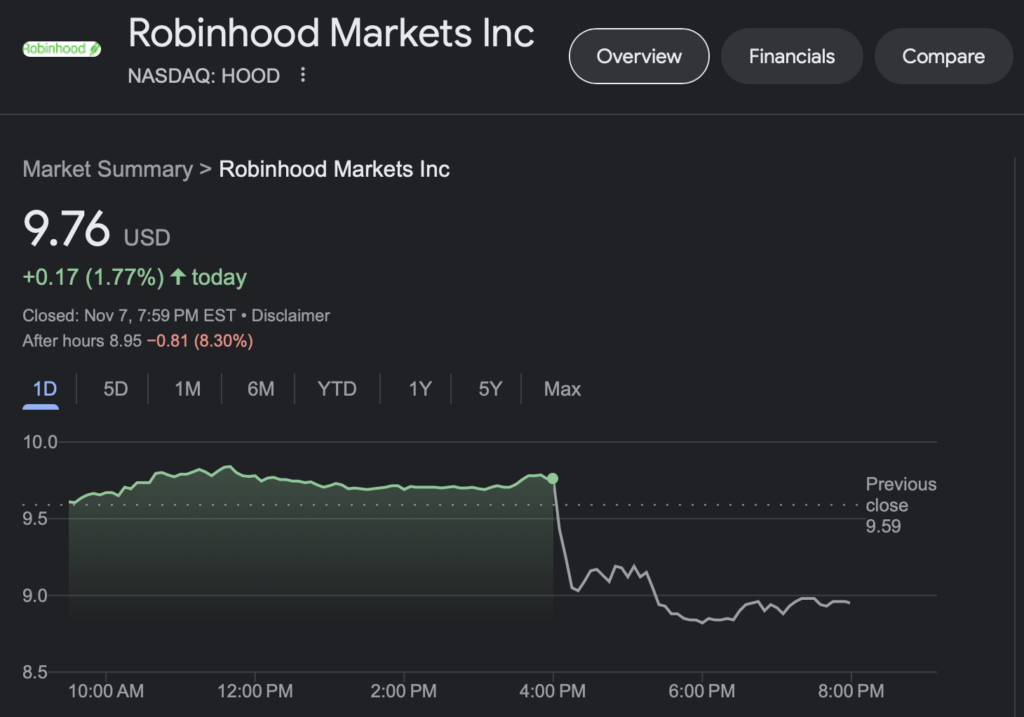Robinhood (NASDAQ: HOOD) shares experienced over 8% decline in after-hours trading on Tuesday following the company’s announcement of revenue figures that fell short of Wall Street expectations. The company reported a net loss in Q3 2023 of $85 million, equivalent to a loss of 9 cents per share, on total revenue of $467 million. In comparison, FactSet consensus estimates had projected a loss of 10 cents per share on revenue of $480 million.
The figures also compare to last year’s net loss of $175 million, translating to 20 cents per share, on total revenue of $361 million.

During the same period, net interest revenues nearly doubled year-over-year, reaching $251 million, while transaction-based revenues saw an 11% decline, totaling $185 million. Revenue from equities trading decreased by 13% to $27 million, and cryptocurrency transaction revenue dropped by 55% to $23 million. Options transaction revenue remained constant at $124 million.
The decline in Robinhood’s cryptocurrency trading revenue persisted in the third quarter of 2023, in line with a trend observed throughout the year. The figure had started at $38 million in the first quarter of 2023 before falling to $31 million in the second quarter, and now the latest reported decline.
Notably, the previous quarter marked a rare profit for the online brokerage during its tenure as a public company. Despite the postmarket dip, Robinhood shares had gained 1.8% in the regular session earlier that Tuesday. The stock had risen by 20% since the start of the year but remained down about 86% from its all-time high reached in August 2021.
During the earnings call, CEO Vlad Tenev emphasized the company’s commitment to enhancing the user experience for its crypto investors, stating, “We’re going to continue to innovate and improve the offering in this space. I think there are lots of promising signs and lots of people spending time building the industry. We’re going to continue to be a leader there.” Chief Financial Officer Jason Warnick added that greater regulatory clarity around crypto would enable Robinhood to innovate more rapidly.
It is worth noting that Robinhood is not the only platform witnessing a slowdown in crypto trading. Coinbase reported a 12% decrease in total transaction revenue in the third quarter compared to the preceding three months, citing low volatility and broader macroeconomic conditions as factors impacting spot market trading volumes.
Robinhood initially launched crypto trading in February 2018, commencing with Bitcoin and Ether, and it does not charge commission fees for such trades. The decision to discontinue support for certain cryptocurrencies like cardano, polygon, and solana in June came after the Securities and Exchange Commission filed a lawsuit against Binance and Coinbase, alleging that several crypto assets were unregistered securities. Nevertheless, Robinhood remains committed to the crypto space, with plans to introduce crypto trading in the European Union in the near future.
Tenev mentioned during the call, “Crypto benefits from a relatively clear regulatory framework in the EU, and we’re excited to bring our capabilities across the pond to better serve that market.” The company has also allowed users of its self-custody Web3 wallet to utilize the Bitcoin and Dogecoin networks for custody, sending, and receiving crypto.
Europe expansion
The crypto broker announced its intention to expand its brokerage operations to the United Kingdom and crypto trading operations to the European Union in the third quarter of 2023. Currently, its crypto brokerage services are exclusively available in the United States.
“Looking ahead, we remain focused on providing industry-leading products that serve far more of customers’ financial needs, gaining market share, expanding internationally, and continuing to change the industry for the better,” said Tenev.
Monthly active users decreased to 10.3 million in the third quarter, down from 12.2 million the previous year, which fell slightly short of the Wall Street expectation of 10.76 million monthly active users according to FactSet.
According to the official figures released by the California-based brokerage, the total number of cumulative funded accounts showed a year-on-year increase of 360,000, reaching a total of 23.3 million.
The collective assets under the brokerage platform’s custody experienced a yearly rise of 34%, reaching $87 billion. Crypto assets held on behalf of customers amounted to $10.2 billion, reflecting a 9% year-on-year improvement, albeit declining by 11% when compared to the previous quarter.
Warnick expressed, “With growing market share of retail trading and increased customer adoption… we’re excited to see momentum building. As we continue to grow revenues and stay lean on expenses, we’re focused on delivering strong operating leverage over time to drive shareholder value.”
Information for this briefing was found via The Wall Street Journal, Blockworks, Finance Magnates, and the sources mentioned. The author has no securities or affiliations related to this organization. Not a recommendation to buy or sell. Always do additional research and consult a professional before purchasing a security. The author holds no licenses.











